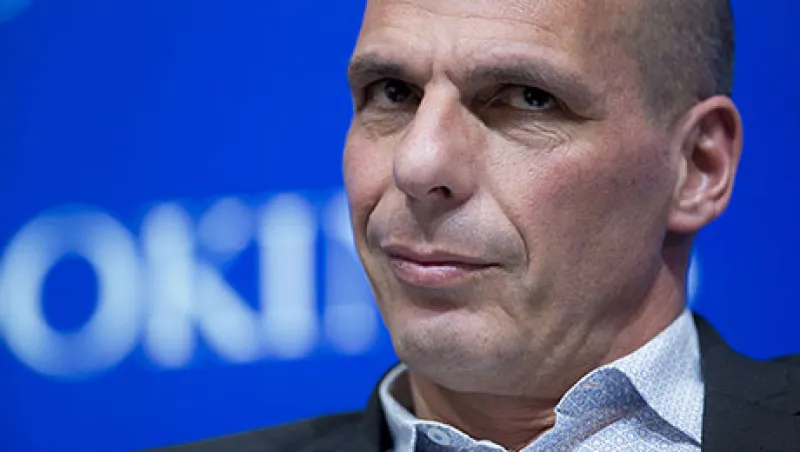Like an old couple that can’t seem to stop fighting, Greece and its European Union partners are wondering if it’s time to head for divorce court.
The saga of Europe’s biggest and most inveterate debtor seems interminable, and for good reason. It’s been threatening to undermine the single currency for more than five years. Yet the Greek crisis appears to be entering a new, and potentially fatal, phase as exhaustion and mutual recriminations push both sides to the brink of an irrevocable rupture.
Signs of fatigue and frustration were more evident than ever at the spring meetings of the International Monetary Fund in Washington, prompting officials to talk about a Greek exit from the euro zone almost as if it were an inevitable outcome rather than an outcome the parties were determined to avoid.
EU and IMF officials stressed how much better placed the euro area economy is today to cope with the fallout of Grexit, were it to happen. The EU has created a permanent bailout facility, the European Stability Mechanism, to help troubled countries. Aid programs are helping Portugal and Spain get back on their feet, just like Ireland before them. And the European Central Bank has shrunk credit spreads drastically and fueled an economic revival with its quantitative easing program.
Mario Draghi, the ECB president who almost single-handedly calmed fears of a breakup nearly three years ago by promising to do “whatever it takes” to save the euro, summed up the collective attitude when he said, “We are better equipped now than in 2012, 2011 or 2010” to cope with the risks of Grexit. Olivier Blanchard, the IMF chief economist, said the risks of contagion from a Greek exit appeared manageable: “It would still not be clear sailing, but it could probably be done.”
There have been plenty of mistakes on all sides since Greece acknowledged back in January 2010 that its deficit and debt were far higher than official figures suggested. The original aid program agreed upon by the EU, the ECB and the IMF contained wildly unrealistic projections of how quickly Greece could return to growth and saddled the country with an unsustainable debt burden. Subsequent revisions offered the Greeks substantial concessions in terms of lengthening maturities and lowering interest rates on the debt in exchange for promises from Athens to undertake serious long-term reforms of everything from its tax collection system to labor and product market rules. Successive Greek governments have dragged their feet in adopting and implementing many of those reforms. But by late last year, the Greek economy showed tentative signs of recovery and the banking system and public finances were stabilizing.
The situation has deteriorated rapidly, however, since Alexis Tsipras and his Syriza party won a sweeping election victory in January on an antiausterity platform. EU officials have plenty of sympathy for Greece’s plight. The country has suffered a truly devastating depression, with economic output down by more than a quarter since the crisis broke out, unemployment standing at nearly 25 percent and public debt at 175 percent of gross domestic product. They also acknowledge that Syriza’s election has changed political realities on the ground in Greece, making more European concessions over debt inevitable in the long run.
Yet EU and IMF officials have grown exasperated at the apparent unwillingness or inability of Tsipras and his Finance minister, Yanis Varoufakis, to engage in serious discussions about ways of getting Greece’s bailout program back on track. Greek brinkmanship has sent yield spreads on government bonds soaring in recent weeks, caused a fresh outflow of funds from the banking system and left the government on the verge of default as it faces a series of major debt repayments. Yet rather than softening its stance in response to the growing pressures, Athens seems to be doubling down. Renewed efforts in the Greek parliament this month to demand nearly €300 billion ($323 billion) in reparations from Germany for Nazi atrocities committed in Greece during World War II have seriously strained ties between Berlin and Athens.
In a speech in Washington last week, Wolfgang Schäuble, the German Finance minister, dismissed the reparation claim as “completely unrealistic” and effectively told the Tsipras government to let him know when it’s ready to talk. “It’s entirely down to Greece,” he said.
Jeroen Dijsselbloem, the Dutch Finance minister and president of the Eurogroup, recalled during a separate address in Washington his first trip to meet with Syriza officials in Athens earlier this year. He said he had a productive discussion with Varoufakis about potential modifications to the bailout program but that when they gave a joint press conference afterward, “Mr. Varoufakis went back into election mode,” slamming the EU as inflexible and demanding major concessions.
Officials are playing down the prospect of a breakthrough at an EU Finance ministers meeting in Riga, Latvia, later this week. The real question is whether the two sides can reach an agreement before major debt servicing bills start coming due in early May. In Washington everyone from U.S. Treasury secretary Jacob Lew to French Finance minister Michel Sapin to IMF managing director Christine Lagarde stepped up the verbal pressure on Athens. Yet the closed-door talks and public debate produced no new grounds for optimism that the two camps can reach an agreement that would avert a Greek default and Grexit.
The real discussion in many EU capitals appears to be shifting to a Plan B: how to keep Greece in the EU if it leaves the euro. There’s no such provision under EU law, but with Vladimir Putin trying to exploit the debt crisis by hinting at Russian aid for Greece as a way of breaching the EU’s wall of sanctions against Russia, EU officials are eager to limit the fallout of Grexit. The fact that they are now talking openly about such a scenario suggests the risk of an exit has risen substantially. Could the EU really curb the contagion effect of an exit? No one knows for sure. The closest parallel anyone can suggest was the fateful decision by U.S. authorities to let Lehman Brothers Holdings go to the wall in 2008, which should be enough to keep any policymaker or investor awake at night.
Draghi summed up the mood when he said he didn’t want to even contemplate the prospect of a Greek exit from the euro. “We all want Greece to succeed,” he said. “The answer is in the hands of the Greek government.”






